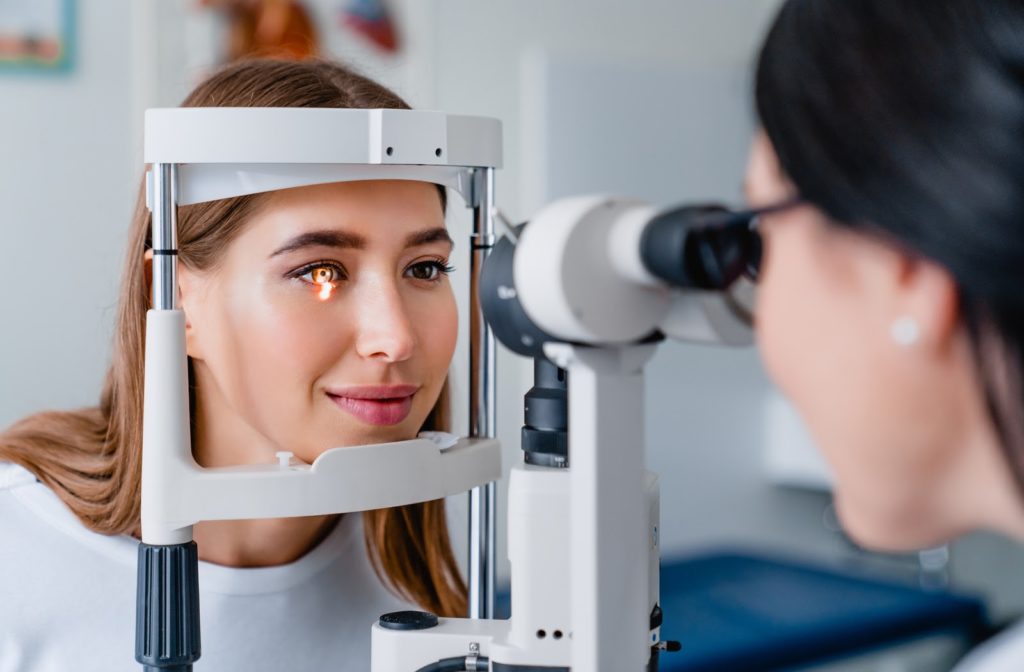Do you know what happens during a comprehensive eye exam? Many people have a general idea of what is included in an eye exam but don’t know the specifics.
Eye exams are useful for identifying and preventing diseases, getting your prescription for eyeglasses & maintaining your current vision health.
Keep reading to learn everything you need to know about comprehensive eye exams.
What are the Different Types of Eye Exams?
There are several different eye exams that you can get done depending on your individual health needs. These include:
Contact Lens Exams
If you wear or want contacts, you need a contact lens exam in addition to a comprehensive eye exam.
Your eye doctor will perform special tests during a contact lens exam to evaluate your vision with contacts. Your eye doctor will:
- Measure your eye surface to determine what size and type of contacts are best for you
- Evaluate your team film to make sure you have enough tears to wear contacts comfortably
- Provide a contact lens prescription that is the right fit for your eyes
- Fit you with a trial pair of contacts until your ordered contacts are delivered
- Book a follow-up exam with you to make sure you have adjusted to your new lenses
It’s essential to get a contact lens exam in addition to comprehensive eye exams because your contacts prescription will be different than your eyeglass prescription. If you wear poorly fitted contacts, they can damage your eyes and even cause vision loss.
Comprehensive Eye Exams
A comprehensive eye exam is an important part of caring for your overall health whether you need vision correction or not. By examining your eyes, your eye doctor can check for signs of serious health conditions that affect your entire body, not just your eyes.
What is a Comprehensive Eye Exam?
A comprehensive adult eye examination includes many different tests to check your overall eye and vision health. A typical comprehensive eye exam consists of the following steps:
- Your doctor will go over your health history, including past and present symptoms and issues, as well as a detailed family history
- Your doctor will ask you questions about your visual needs at home, work, school and any other areas of concern
- Your eye doctor will measure the visual acuity of each eye
- They will diagnose your refractive status and your prescription if needed
- You will get a binocular vision assessment which tests your eye coordination, depth perception, and eye movements
- Your doctor will evaluate your colour vision
- They will assess the health of the eye itself both inside and outside tools such as a biomicroscope, ophthalmoscope or dilation
- You may get a screening for glaucoma
- After the eye tests are finished, your eye doctor will use their knowledge, experience and judgment to analyze your results
- Finally, your eye doctor will discuss treatment plans and recommendations with you

Why are Comprehensive Eye Exams Important?
Eye exams are critical because some eye diseases show minimal or no symptoms until it is too late. Therefore, early detection is essential to slowing down their progression and preventing future vision loss.
During an eye examination, your eye doctor performs multiple tests to spot initial signs of these diseases and help you treat them before they get worse.
When Should You Get a Comprehensive Eye Exam?
Signs & Symptoms of Vision Problems
You should book an appointment to have an eye exam if you are experiencing any of the following signs or symptoms:
- Eye redness
- Changes in the color of the eye
- Itching, burning, or a heavy discharge in the eyes
- Eye pain in or around the eye
- Changes in your vision, including blurred vision or double vision
- Seeing flashes of light or halos around lights
- Unusual sensitivity to light or glare
Regular Eye Exams
You should see your eye doctor often depending on your age, overall health, and risk of developing common eye disorders and diseases. The general guideline by age for how often you should see your eye doctor is as follows:
- Before a child turns 3, they should receive a regular eye exam
- By 5 or 6, children should get their eyes examined every 2 years
- For adults, the American Academy of Ophthalmology (AAO) recommends having an eye exam once a year
In some cases, your eye doctor may recommend that you get an eye exam more frequently than outlined in the above guide. If any of the following apply to you, you may need to have an eye exam more than once a year:
- You have other health issues that increase your risk of eye disease, such as diabetes
- Take certain medications, like antihistamines or antidepressants that have side effects that affect your eyes
- You wear glasses or contact lenses and need your prescription updated
- You have a history of eye disease or vision issues in your family
Booking a Comprehensive Eye Exam
Booking an eye exam is the only way to ensure your eyes stay healthy for years to come. Your eye doctor will go over any questions or concerns you may have and, if needed, will discuss appropriate treatment plans with you.



